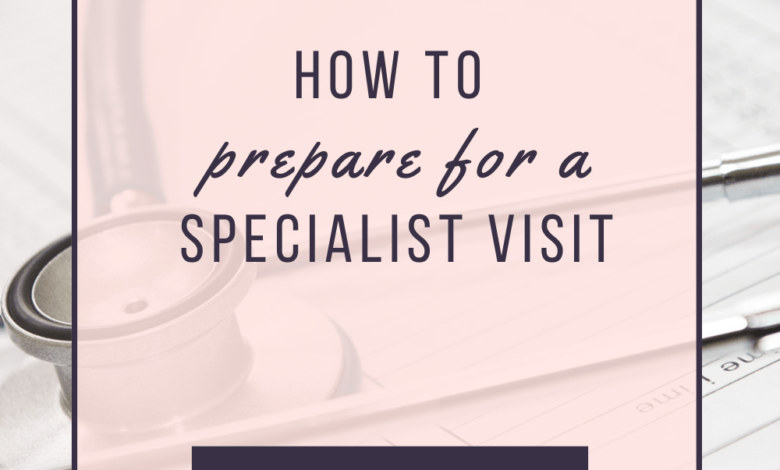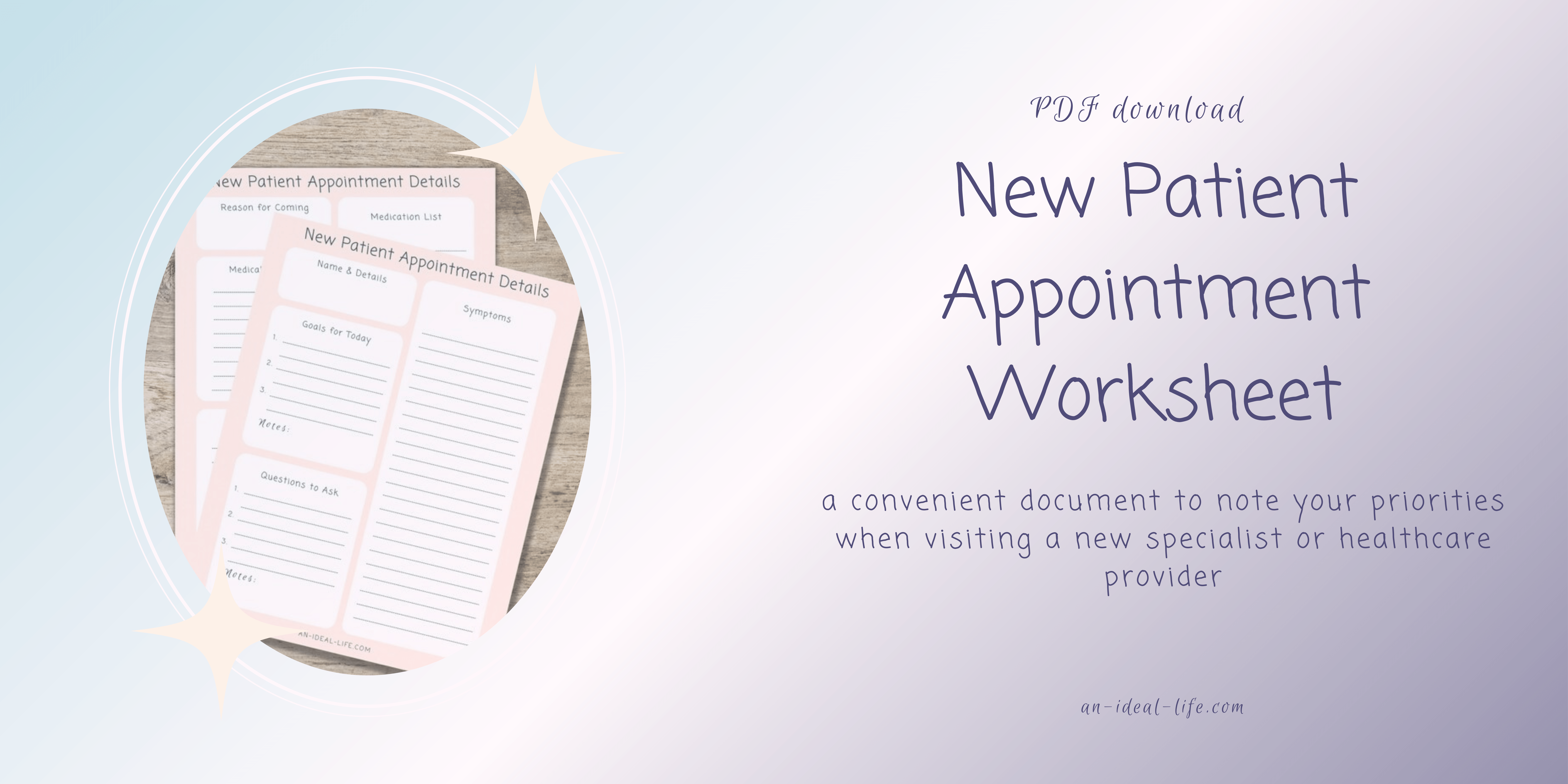How to Prepare for a Specialist Visit

Visiting a specialist—especially a new specialist—can be a daunting experience! But, by taking the time to prepare for a specialist visit, you can alleviate your nerves while making sure you get the best care possible.
*This post may include affiliate or referral links. At no extra cost to you (and with a special reader discount, in some cases!), I’ll receive a small commission or other rewards to help support An Ideal Life. As an Amazon Associate, I earn from qualifying purchases*
The information in this blog post is provided for educational and informational purposes only and should not be construed as medical advice. The content is not intended to be a substitute for professional medical advice, diagnosis, or treatment. Always seek the advice of your physician or other qualified healthcare provider with any questions you may have regarding a medical condition. Never disregard professional medical advice or delay seeking it because of something you have read online. The author of this post is not a licensed medical professional and does not assume any liability for any actions taken based on the information contained in this post.
Understand Your Specialist’s Role
Different specialists focus on various aspects of your health. Understanding your specialist’s unique role within your medical team can help you prepare specific questions and understand the context of their advice.
Common types of specialists include:
- Allergist/Immunologist: Specializes in diagnosing and treating allergic conditions and immune system disorders
- Cardiologist: Focuses on diagnosing and treating heart and blood vessel conditions.
- Dermatologist: Treats skin, hair, and nail conditions
- Endocrinologist: Specializes in hormone-related disorders such as thyroid issues
- Gastroenterologist: Focuses on the digestive system and its disorders
- Hematologist: Diagnoses and treats blood disorders
- Hepatologist: Specializes in liver, gallbladder, biliary tree, and pancreas diseases
- Infectious Disease Specialist: Treats complex infections caused by bacteria, viruses, fungi, or parasites
- Nephrologist: Focuses on kidney health and diseases
- Neurologist: Diagnoses and treats disorders of the nervous system, including the brain and spinal cord
- Oncologist: Treats cancer and provides medical care for a person diagnosed with cancer
- Ophthalmologist: Diagnoses and treats eye disease and performs eye surgery
- Orthopedist: Treats conditions related to the musculoskeletal system, including bones, joints, and muscles
- Otolaryngologist (ENT): Specializes in ear, nose, and throat disorders
- Pulmonologist: Focuses on lung and respiratory system conditions
- Rheumatologist: Diagnoses and treats rheumatic diseases, such as arthritis and lupus
- Urologist: Treats urinary tract disorders in both men and women, as well as male reproductive system disorders.
Gather Your Medical Records
Before your appointment collect any relevant medical records, such as recent test results, imaging studies, and previous specialist reports. Having this information on hand will provide your specialist with a comprehensive view of your medical history, helping them diagnose and recommend treatment more effectively. These details being readily available also saves time during your appointment and prevents and unnecessary repeat tests.
Know Your Symptoms and History
Take some time to jot down your symptoms, noting their frequency, onset, and any factors that exacerbate them. You could take this a step further and create a timeline of your symptoms to provide a clear picture and note any patterns or triggers related to your symptoms. It can also be helpful to write down your medical history and any relevant family history, including any chronic conditions, surgeries, or hospitalizations. This will help you communicate clearly with your specialist, ensuring they understand your condition thoroughly.
Get a List of Medications Ready
As you prepare for a specialist visit, create a detailed list of all the medications you are currently taking, including any prescriptions, over-the-counter drugs, and supplements. Be sure to include the dosages and frequency! Alternatively, pack your actual medications in a bag for your visit. This is crucial to prevent any potential interactions and recommend appropriate treatments. If you’re experiencing any side effects, take note of these as well.
Compile Relevant Lifestyle Information
Consider taking the time to document any aspects of your lifestyle that might impact your health as you prepare for a specialist visit. This might include factors such as diet, exercise, sleep patterns, and any recent changes to your lifestyle. Providing this information can offer greater context and insight into your symptoms.

Bring a Support Person
If it makes you more comfortable, consider bringing a trusted friend or family member to your appointment. They can provide emotional support, help you remember important details, and ask questions you might not think of during the consultation. Having another set of ears can also ensure that you don’t miss any important information. They can even take notes for, you allowing you to focus on the conversation.
List Questions to Ask Your Doctor
It’s important to go into your appointment with a list of questions you want to ask in order to get all the information you need to make informed decisions about your health. We even offer a free “Questions to Ask Your Doctor” printable to make it even easier! Get it in our resource library when you sign up for the AIL newsletter:
Here are a few sample questions to get you started as you prepare for a specialist appointment:
- What is the likely cause of my symptoms?
- What tests do I need, and why?
- What are my treatment options, and what are the potential side effects?
- Are there any lifestyle changes I should make to improve my condition?
Review Insurance and Referrals
Make sure you understand your coverage and whether you need a referral to prepare for a specialist visit. If needed, contact your insurance provider with any questions about coverage.
Arrive Early
On the day of your appointment, plan to arrive a little early. This will give you time to compete any necessary paperwork and settle in before your consultation. Be sure to bring any identification and insurance information to help the check-in process go as smoothly as possib;e. Arriving early can also reduce stress from rushing or being late to your visit!
Take Notes During Your Appointment
During the consultation, take notes on what the specialist says on the “Answers” side of your Questions to Ask Your Doctor worksheet, in a dedicated notebook, or on a piece of scrap paper (just be sure to file it somewhere safely after so it doesn’t disappear!). Don’t hesitate to ask ffor clarification if somethinng is unclear—your health is too important to leave questions unanswered!
Follow Up on Recommendations
After your appointment, make sure to follow through on any recommendations or referrals given by the specialist. Schedule any additional tests or appointments as soon as possible to keep your care on track. Then, take some time to review your notes and update any personal medical records. If you have any further questions or concerns, contact the specialist’s office.
Figuring out how to prepare for a specialist visit doesn’t have to be stressful! By following these steps, you can ensure that you are ready to make the most of your appointment.
Source link



